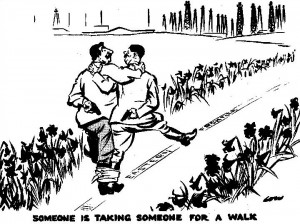It is a fundamental principle of German foreign policy that talks are the best way to solve diplomatic problems. Such was the rationale behind Gernot Erler’s recent trip to Moscow to speak with Russian parliamentarians about the ongoing Ukraine-related difficulties. There was no one in parliament who was willing to speak with him.
For Erler, the message was clear: Russia is no longer particularly interested in dialogue. That is true for simple parliamentarians just as it is for Vladimir Putin. The Russian president still, to be sure, speaks regularly with Angela Merkel. But the chancellor believes that what Putin says and what Putin does have long since diverged. Russian policy, says Erler, is currently following the “principle of organized unpredictability.”
From the perspective of Berlin, Russia has gone from being a difficult partner to being an adversary within just one year. One official at Merkel’s Chancellery says that in some ways the situation is even more difficult than it was during the latter phases of the Soviet Union. Back then, the official says, Moscow at least adhered to agreements.
Berlin has observed a broad new approach by the Kremlin in the Balkans. The same holds true for Serbia’s neighbor, Bosnia-Herzegovina. In a paper on “Russia’s soft-power strategy” in the Balkans that was drafted for Putin by the influential Council on Foreign Relations in Moscow.
Putin would seem to have taken the advice to heart. The Russian Railways company, headed by Putin-ally Vladimir Yakunin, is currently refurbishing a 350-kilometer (217 mile) stretch of track in Serbia at a cost of three-quarters of a billion euros. Furthermore, the Moscow-based oil multinational Lukoil now owns 79.5 percent of the local service-station chain Beopetrol while Gazprom holds majority ownership of the country’s largest natural gas supplier. “Russian investments have improved the prospects of regions that were heavily damaged by the NATO bombardment in 1999,” the paper reads. In Montenegro, Russia is the largest foreign investor, with Russians controlling one-third of all companies in the country.
The German government believes that Russia’s approach in the region has been largely successful. The Foreign Ministry analysis notes that October’s 70th anniversary celebration of Belgrade’s liberation from the Nazis was moved up by four days to coincide with Putin’s visit there.
One particularly odd meeting underscores the methods Putin uses to expand his influence in Serbia. One year ago, Nikoli received the head of the Moscow motorcycle club Night Wolves, Alexander Zaldostanov. Putin refers to Zaldostanov (alias: The Surgeon) as his “brother.” The gang has made repeated headlines for its outspoken anti-Semitism and homophobia, stances that are consistent with attitudes widely held in Serbia.
It is not easy for the German government to counteract the Russian offensive. Angela Merkel has sought to thwart Putin’s efforts diplomatically. At a Balkans conference in the Chancellery at the end of August, she encouraged the gathered heads of state and government to commit to a pro-EU path.
Putin’s efforts to expand his influence do not stop at EU borders. Now he is doing his best on influence policy-making in individual EU member states, particularly in Bulgaria.
The country has traditionally been closely allied with Russia and is almost completely dependent on Russian natural gas and oil. An internal report from the German Foreign Ministry notes that around 300,000 Russians have bought property in Bulgaria. Officials in the Chancellery are concerned that Putin could seek to instrumentalize the alleged interests of the Russian minority there.
The fundamental problem from a Western standpoint is the fact that the desire for escalation and the ability to do so is not divided equally. Putin appears prepared to promote Russian interests in his neighborhood economically, politically and, if necessary, militarily. The West doesn’t have much to offer in response.
Critics of Moscow, such as Andreas Schockenhoff, the deputy head of Merkel’s conservatives in German parliament, believe that the sanctions must be maintained until the costs become too great for Putin. But even during the last round of EU sanctions, Merkel had difficulty convincing skeptics, such as Italian Prime Minister Matteo Renzi and Hungarian Premier Viktor Orban to agree to the penalties. She was thus particularly upset by recent comments by the EU’s new foreign policy chief, Federica Mogherini, calling the effectiveness of sanctions into question.

